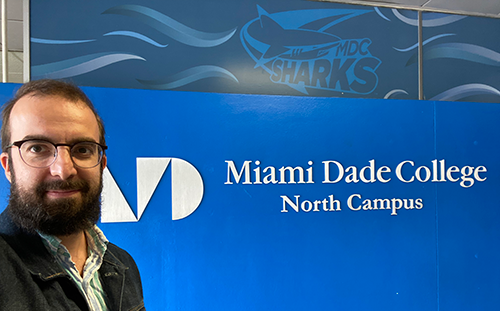Postdoctoral fellow Guilherme Oliveira recognized for study on the intellectual as social educator

The postdoctoral fellow is a philosophy professor at Miami Dade College, in Florida, in the United States / Photo: personal archive
Guilherme Magalhães Oliveira, a postdoctoral fellow at the Graduate Program in Education of PUCRS and Philosophy professor at Miami Dade College, Florida, U.S., made his presence felt at the conference Truth in the Late Focault. The event was held at University of South Carolina (UofSC), in the U.S., and was organized by the University’s Comparative Literature Program, under the coordination of Professor Paul Allen Miller, a renowned researcher in the field of Foucauldian studies in the USA.
Oliveira was recognized for his work in the area of Theories and Cultures in Education, of the Graduate Program in Education. He is advised by Dr. José Luis Ferraro, School of Health and Life Sciences and School of Humanities professor. In the investigation, the postdoctoral researcher connects criticism in education with criticism in the sciences to understand governmentalization in the so-called liberal societies, according to the thinking of Michel Foucault and other scholars.
Oliveira has been invited to submit an article to one of the journals of the Department of Comparative Literature at the UofSC. “This is such a traditional event and my presence there was essential to connect with other researchers specialized in Foucault in order to build a network of people interested in working together”, Oliveira added.
The research by Guilherme Oliveira seeks to unveil the role of the intellectual as a social educator and how his scientific productions and his public work strongly connects to citizens. The way he sees it, the social effects of this formative power are even clearer when intellectuals and specialists resort to mass media, such as newspapers, magazines, television and cultural events. In these scenarios, specialists can help the population understand the current reality, as a non-institutional form of governing their conduct.
“It is about understanding the role of experts in conducting the political, social and ethical discussions that permeate the approach to a pandemic and how the discursive game of expertise tends to change and oppose institutional guidelines and the will of the population in relation to the events”, the researcher adds.
The main reflection proposed by Oliveira’s research is to unveil the effects of truth and power of educational practices beyond educational institutions. In this way, his work draws attention to certain power games played by social expertise when it goes beyond its field of expertise and which are not politically attributed to educational and political institutions, but which are equally effective in shaping society.
Oliveira seeks to highlight education as a practice and a form of thinking that is both critical and governmental. With this work, Oliveira tried to put into perspective and increase the quality of such expertise on public opinion, thus demonstrating that there is nothing good or bad in it.
“With this, I sought to draw attention to an analytical and critical approach to the social function of knowledge, in order to foster discussions and ways of intervening in human behavior without falling back into alarmism, fake news or extremist / authoritarian tendencies of the broad political spectrum”, he highlights.